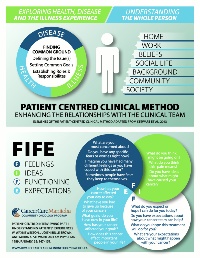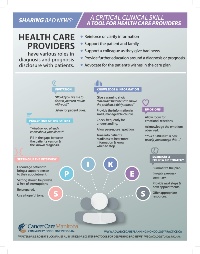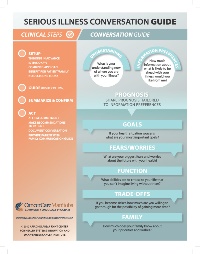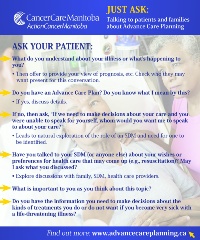Advance Care Planning with Your Patients
As health care technologies improve and people with many complex diseases live longer, advance care planning is becoming increasingly important.
You have an important role in ACP. Health care providers should encourage advance care planning to people who are facing a life-threatening condition, have a chronic disease, and also to people who are young and healthy. ACP conversations should be held, if at all possible, before a health care crisis occurs so that the person has time to consider his or her choices and talk with loved ones.
For health care providers, integrating advance care planning into routine clinical encounters enables them to help patients, families and substitute decision-makers to prepare for the kinds of decisions they may face in the future. These conversations explore the patient's wishes and goals for treatment framed within the therapeutic options that are appropriate for their condition. Conversations are best started early in the patients' course of care and treatment and whenever clinically relevant to the patient's care. These discussions should include the following:
- Patient's prognosis and the anticipated outcomes of the current treatment
- Exploration of the patient's values, understandings, hopes, wishes and expected outcomes of treatment
- Who can speak for them if they can't speak for themselves
- The role of life support interventions and life-sustaining measures and their expected degree of benefit
- Information about comfort measures
- Information on resources such as palliative care, social work, navigation, spiritual care, etc.
By having these conversations with patients early on, many members of the health care team feel more comfortable providing care that they know is in accordance with the person's wishes. If everyone understands the person's wishes, there is less anguish associated with end-of-life decision-making, reducing the potential for conflict between the person's loved ones and the health care team and between members of the health care team. Advance care planning is a way of preventing problems in decision-making should a time occur when a person becomes incapable and may need to rely on others. An advance care plan strengthens the relationship between health care providers and the people for whom they care.
Questions regarding ACP, please contact us at 204-784-0210 or by email at transitions@cancercare.mb.ca
CCMB Resources and Tools for Oncology Professionals
FIFE Framework
FIFE framework - patient centred interviewing tool that can assist with shared decision making
SPIKES tool
SPIKES tool - a six step protocol that can assist with breaking bad news to cancer patients
Serious Illness Conversation Guide
Serious Illness Conversation Guide - conversation prompters for discussing serious illness
Just Ask Tool
Just Ask tool - tips for how to talk to patients about advance care planning.
Talking about advance care planning?
Additional Resources and Tools for Health Care Professionals
Advance Care Planning in Canada
Speak Up: Additional resources for Health Care Professionals
WRHA Advance Care Planning
Resources and Tools for Health Care Professionals
Promoting Excellence in End-of-Life Care
Steps to Discussing Advance Care Plans
Winnipeg Regional Health Authority
Authority Advance Care Planning Booklet
Education in Palliative and End-of-Life Care for Oncology (EPECTM-O Canada)
A curriculum in palliative and end-of-life care for oncology professionals. Materials can be ordered through the Canadian Partnership Against Cancer at cancerjourney@partnershipagainstcancer.ca







